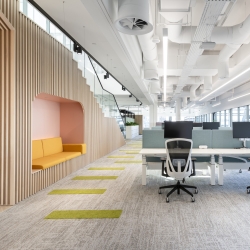September 27, 2023
Half of landlords now planning a flexible working offer
 Over half of UK landlords are planning to independently develop an offering for the growing flexible working market across their portfolios, according to the annual report on the flexible workspace sector by The Instant Group. The 2023 UK State of the Flex Market report [registration] polled more than 200 flex operators and landlords for insights into the sector. Findings also suggest that two-thirds (61 percent) of flex operators intend to increase their footprint in the next two years, while market imbalances in regional hubs, enduring occupancy rates, and surging demand for sustainable buildings all featured prominently in the report. (more…)
Over half of UK landlords are planning to independently develop an offering for the growing flexible working market across their portfolios, according to the annual report on the flexible workspace sector by The Instant Group. The 2023 UK State of the Flex Market report [registration] polled more than 200 flex operators and landlords for insights into the sector. Findings also suggest that two-thirds (61 percent) of flex operators intend to increase their footprint in the next two years, while market imbalances in regional hubs, enduring occupancy rates, and surging demand for sustainable buildings all featured prominently in the report. (more…)











 Commercial Interiors UK (CIUK), the Trade Association for the UK’s Commercial Interiors Sector has appointed Sean Holt as its new Managing Director. As the new Managing Director, Sean will be responsible for leading a dedicated team to deliver the revised strategy of CIUK following its recent re branding from BCFA, improving member engagement and benefits, increasing membership and growing the CIUK events portfolio whilst working closely with its media partner Design Insider to build on its growing reputation as the premier online portal dedicated to commercial interior designers and architects.
Commercial Interiors UK (CIUK), the Trade Association for the UK’s Commercial Interiors Sector has appointed Sean Holt as its new Managing Director. As the new Managing Director, Sean will be responsible for leading a dedicated team to deliver the revised strategy of CIUK following its recent re branding from BCFA, improving member engagement and benefits, increasing membership and growing the CIUK events portfolio whilst working closely with its media partner Design Insider to build on its growing reputation as the premier online portal dedicated to commercial interior designers and architects. 





















June 27, 2023
Understanding the power of mindset and what it can do for you
by Lisa Collinson • Business, Comment, Wellbeing, Workplace